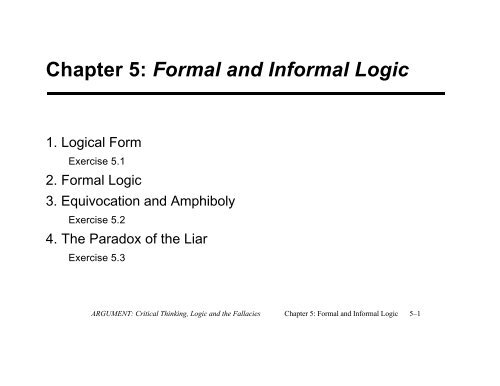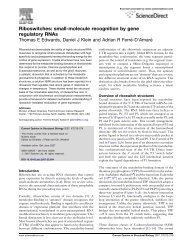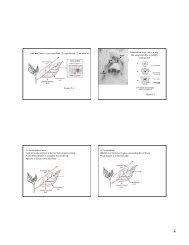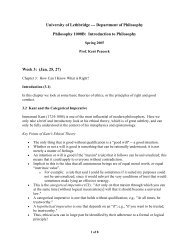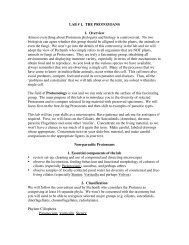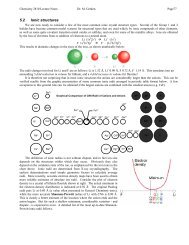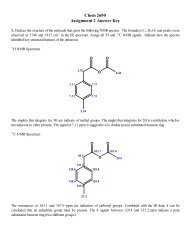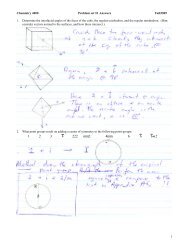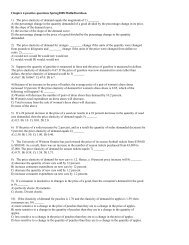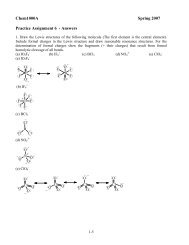Chapter 5: Formal and Informal Logic
Chapter 5: Formal and Informal Logic
Chapter 5: Formal and Informal Logic
Create successful ePaper yourself
Turn your PDF publications into a flip-book with our unique Google optimized e-Paper software.
<strong>Chapter</strong> 5: <strong>Formal</strong> <strong>and</strong> <strong>Informal</strong> <strong>Logic</strong><br />
1. <strong>Logic</strong>al Form<br />
Exercise 5.1<br />
2. <strong>Formal</strong> <strong>Logic</strong><br />
3. Equivocation <strong>and</strong> Amphiboly<br />
Exercise 5.2<br />
4. The Paradox of the Liar<br />
Exercise 5.3<br />
ARGUMENT: Critical Thinking, <strong>Logic</strong> <strong>and</strong> the Fallacies <strong>Chapter</strong> 5: <strong>Formal</strong> <strong>and</strong> <strong>Informal</strong> <strong>Logic</strong> 5–1
<strong>Logic</strong>al Form – Repetition<br />
• Bill has $5 in his pocket<br />
Therefore, Bill has $5 in his pocket<br />
• Sue has visited California<br />
Therefore, Sue has visited California<br />
• (P1) p<br />
(C) p<br />
ARGUMENT: Critical Thinking, <strong>Logic</strong> <strong>and</strong> the Fallacies <strong>Chapter</strong> 5: <strong>Formal</strong> <strong>and</strong> <strong>Informal</strong> <strong>Logic</strong> 5–2
<strong>Logic</strong>al Form – Disjunctive Syllogism<br />
• Bill is in New York or Bill is in London<br />
It is not the case that Bill is in New York<br />
Therefore, Bill is in London<br />
• Sue went to the movies or Sue left town<br />
It is not the case that Sue went to the movies<br />
Therefore, Sue left town<br />
• (P1) p ∨ q<br />
(P2) ∼p<br />
(C) q<br />
ARGUMENT: Critical Thinking, <strong>Logic</strong> <strong>and</strong> the Fallacies <strong>Chapter</strong> 5: <strong>Formal</strong> <strong>and</strong> <strong>Informal</strong> <strong>Logic</strong> 5–3
Grammatical versus <strong>Logic</strong>al Form<br />
The grammatical form of a proposition (or of an argument)<br />
• is the structure of the proposition (or argument) as indicated by<br />
the surface grammar of its natural language<br />
The logical form of a proposition (or of an argument)<br />
• is the logically effective structure of the proposition (or argument)<br />
as indicated by the meanings of the logical terms it contains<br />
ARGUMENT: Critical Thinking, <strong>Logic</strong> <strong>and</strong> the Fallacies <strong>Chapter</strong> 5: <strong>Formal</strong> <strong>and</strong> <strong>Informal</strong> <strong>Logic</strong> 5–4
Example — Grammatical versus <strong>Logic</strong>al Form<br />
"Tom, Dick <strong>and</strong> Harry lifted the box"<br />
Grammatical form<br />
• (Tom, Dick, Harry) lifted the box<br />
Potential logical forms<br />
• (Tom, Dick, Harry) lifted the box<br />
• (Tom lifted the box) <strong>and</strong> (Dick lifted the box) <strong>and</strong> (Harry lifted the<br />
box)<br />
ARGUMENT: Critical Thinking, <strong>Logic</strong> <strong>and</strong> the Fallacies <strong>Chapter</strong> 5: <strong>Formal</strong> <strong>and</strong> <strong>Informal</strong> <strong>Logic</strong> 5–5
Example — Grammatical versus <strong>Logic</strong>al Form<br />
"I see nobody on the road," said Alice.<br />
"I only wish I had such eyes," the King remarked in a fretful tone. "To<br />
be able to see Nobody! And at that distance too! Why, it's as much<br />
as I can do to see real people, by this light!"<br />
Grammatical forms<br />
• I see somebody on the road<br />
• I see nobody on the road<br />
<strong>Logic</strong>al forms<br />
• I see somebody on the road<br />
• It is not the case that (I see somebody on the road)<br />
ARGUMENT: Critical Thinking, <strong>Logic</strong> <strong>and</strong> the Fallacies <strong>Chapter</strong> 5: <strong>Formal</strong> <strong>and</strong> <strong>Informal</strong> <strong>Logic</strong> 5–6
Material Content versus <strong>Logic</strong>al Form<br />
Is validity always a function of an argument's logical form?<br />
• <strong>Formal</strong>ists claim that all logical properties can be explained using<br />
logical form alone<br />
• Anti-formalists claim that not all logical properties can be<br />
explained using logical form alone<br />
Example<br />
Socrates is a father<br />
Socrates is a father [All fathers are male]<br />
Therefore, Socrates is male Therefore, Socrates is male<br />
ARGUMENT: Critical Thinking, <strong>Logic</strong> <strong>and</strong> the Fallacies <strong>Chapter</strong> 5: <strong>Formal</strong> <strong>and</strong> <strong>Informal</strong> <strong>Logic</strong> 5–7
Uniform Substitution Instances<br />
From logical forms to propositions<br />
• Given a logical form, any number of arguments may be produced<br />
by uniformly substituting (atomic or molecular) propositions for<br />
propositional variables<br />
From propositions to logical forms<br />
• Given a proposition, a finite number of logical forms may be<br />
produced by uniformly substituting propositional variables for<br />
propositions<br />
ARGUMENT: Critical Thinking, <strong>Logic</strong> <strong>and</strong> the Fallacies <strong>Chapter</strong> 5: <strong>Formal</strong> <strong>and</strong> <strong>Informal</strong> <strong>Logic</strong> 5–8
Example — Uniform Substitution Instances<br />
Find all of the propositional forms for which the following proposition is<br />
a uniform substitution instance:<br />
Proposition<br />
• ~A ⊃ ~B<br />
Propositional forms<br />
• p p ⊃ q ~p ⊃ q p ⊃ ~q ~p ⊃ ~q<br />
ARGUMENT: Critical Thinking, <strong>Logic</strong> <strong>and</strong> the Fallacies <strong>Chapter</strong> 5: <strong>Formal</strong> <strong>and</strong> <strong>Informal</strong> <strong>Logic</strong> 5–9
The Fallacy of Equivocation<br />
The fallacy of equivocation<br />
• occurs whenever an argument depends inappropriately on a<br />
semantic ambiguity<br />
• occurs whenever a semantic ambiguity plays a significant but<br />
inappropriate role in an argument<br />
Example<br />
"The existence of a law means that there must be a law maker. But<br />
we know that the law of gravity <strong>and</strong> other scientific laws have not<br />
been made by any human law maker. So it follows that there must be<br />
a non-human law maker, God."<br />
• Here the equivocation is on "law" (i.e. "a prescriptive claim<br />
enacted by a government" or "a descriptive regularity in nature")<br />
ARGUMENT: Critical Thinking, <strong>Logic</strong> <strong>and</strong> the Fallacies <strong>Chapter</strong> 5: <strong>Formal</strong> <strong>and</strong> <strong>Informal</strong> <strong>Logic</strong> 5–10
Example – Equivocation<br />
The end of a thing is its perfection<br />
Death is the end of life<br />
Therefore, death is the perfection of life<br />
• Here the equivocation is on the word "end" (i.e. "goal" or<br />
"termination")<br />
ARGUMENT: Critical Thinking, <strong>Logic</strong> <strong>and</strong> the Fallacies <strong>Chapter</strong> 5: <strong>Formal</strong> <strong>and</strong> <strong>Informal</strong> <strong>Logic</strong> 5–11
(1) The goal of a thing is its perfection True<br />
Death is the goal of life False<br />
Therefore, death is the perfection of life False / Valid<br />
(2) The termination of a thing is its perfection False<br />
Death is the termination of life True<br />
Therefore, death is the perfection of life False / Valid<br />
(3) The goal of a thing is its perfection True<br />
Death is the termination of life True<br />
Therefore, death is the perfection of life False / Invalid<br />
(4) The termination of a thing is its perfection False<br />
Death is the goal of life False<br />
Therefore, death is the perfection of life False / Invalid<br />
ARGUMENT: Critical Thinking, <strong>Logic</strong> <strong>and</strong> the Fallacies <strong>Chapter</strong> 5: <strong>Formal</strong> <strong>and</strong> <strong>Informal</strong> <strong>Logic</strong> 5–12
The Fallacy of Amphiboly<br />
The fallacy of amphiboly<br />
• occurs whenever an argument depends inappropriately on a<br />
grammatical, rather than a purely semantic, ambiguity<br />
• occurs whenever a grammatical ambiguity plays a significant but<br />
inappropriate role in an argument<br />
Example<br />
• Thrifty people save old cardboard boxes <strong>and</strong> waste paper<br />
Therefore, thrifty people waste paper<br />
p ∧ q p ∧ q<br />
q r<br />
ARGUMENT: Critical Thinking, <strong>Logic</strong> <strong>and</strong> the Fallacies <strong>Chapter</strong> 5: <strong>Formal</strong> <strong>and</strong> <strong>Informal</strong> <strong>Logic</strong> 5–13
The Paradox of the Liar<br />
Is the following proposition true or false?<br />
This proposition is false<br />
• If every proposition is either true or false then this proposition will<br />
be either true or false<br />
• If it is true, then it is true that it is false; so it must be both true <strong>and</strong><br />
false<br />
• If it is false, then it is false that it is false; so it must be true; so it<br />
must be both true <strong>and</strong> false<br />
• So in both cases it is both true <strong>and</strong> false, which is impossible<br />
ARGUMENT: Critical Thinking, <strong>Logic</strong> <strong>and</strong> the Fallacies <strong>Chapter</strong> 5: <strong>Formal</strong> <strong>and</strong> <strong>Informal</strong> <strong>Logic</strong> 5–14
Other Paradoxes<br />
• The Postcard Paradox<br />
• The Heterological Paradox<br />
• The Barber Paradox<br />
• The Protagoras Paradox<br />
• The Russell Paradox<br />
ARGUMENT: Critical Thinking, <strong>Logic</strong> <strong>and</strong> the Fallacies <strong>Chapter</strong> 5: <strong>Formal</strong> <strong>and</strong> <strong>Informal</strong> <strong>Logic</strong> 5–15
Object-language versus Meta-language<br />
A meta-language is<br />
• any language used to talk about a (usually separate) language<br />
An object language is<br />
• any language being talked about<br />
ARGUMENT: Critical Thinking, <strong>Logic</strong> <strong>and</strong> the Fallacies <strong>Chapter</strong> 5: <strong>Formal</strong> <strong>and</strong> <strong>Informal</strong> <strong>Logic</strong> 5–16


